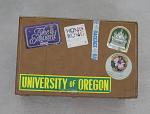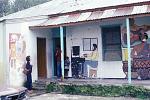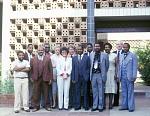
|
The Magic |
During the summer of 1982 we had the pleasure of presenting a series of career guidance and counseling workshops to counselors and teachers in South Africa. That was 25 years or a quarter of a century ago as of this writing. The trip was our most unique travel adventure and thus it seems appropriate to include a description of our experiences in the Thinkpint Page “Traveling With Jack and Theresa.” The workshop tour was arranged and produced by Barry Beck, Ph.D., counselor and educator in Durban, South Africa, who arranged for a host- contact person at each of the several venues we visited. The hosts made travel and per deim details which allowed us to concentrate on the workshop programs per se. What a gift! Barry is a world class organizer, among other attributes, who now resides in France and South Africa. The content of the career workshops was based largely on learning modules we had developed in our University of Oregon courses and in our consulting practice, United Learning Corporation. The modules design allowed us to adjust workshop objectives and learning procedures to the nature of the several kinds of audiences involved as well as scheduling idiosyncracies of the several venues. Our learning aids and materials were organized in a large leather case, much like those airline pilots and manufacturer reps carry which we fondly came to call, The Magic Box. Participants
Workshop participants were young and middle aged adults including teachers, counselors, and supervisors in public secondary schools, technicons, colleges, and service agencies. Apartheid was alive and functioning in 1982 and Nelson Mandela was still in prison. Thus race was a variable to be considered when designing our educational tour. Barry Beck provided valuable counsel regarding this issue. While the racial designations took several forms, for example Asian was often defined as “other than white”, the official racial designations were and still are English Speaking White, Afrikaans (Dutch descendants), Black, Colored, and Indian. The participant groups consisted of White (English and Afrikaner), Black, and mixed race.
Learning Objectives and Topics Learning Objectives The workshops were designed to meet the following three learning objectives. 1. Assist participants understand a variety of career development concepts. Some of these were standard for the trade and others had been developed by us over several years. 2. Assist participants begin developing competencies for implementing selected career development concepts with students and clients. In order to do this participants needed to actually practice the procedures. We could barely implement this objective in the limited time available, but it was our experience that if participants understood several of the concepts and how to implement them, it was not especially difficult for them to generalize the methodology to other concepts and competencies. 3. Provide practice in developing additional career concepts and competencies applicable to the needs and interests of their students and clients and consistent with their particular conditions. In other words, clarify and practice the concept of creating career development materials. Written descriptions of the concepts and procedures with which we were concerned were available in several of our publications including: “Career Survival Skills”, “Career & Life Planning Guide”, “Helping Others Help Themselves”, and “Producing Workshops, Seminars, Short Courses: A Trainer’s Handbook.” Consequently, there were documented examples of career development concepts and procedures consistent with our career development model and examples of creating procedures. A particular three component definition of career was basic to implementing the career model upon which our work was based. It suggested that a career consisted of behaviors that could be organized under three kinds of life activities: 1. Job–behaviors which contribute to basic survival needs, i.e. making a living
Learning Topics Example of learning topics in the modules included: * Developing Career Information
Learning Procedures “Interactive Team Teaching”, in pedagogical jargon, was the presentation style from the participants’ perspective, but the learning effectiveness was very much dependent upon students being part of our Dog and Pony Shows, but it was Le Show that was most frequently mentioned in evaluations. We both had an interest in a systems approach to designing learning materials that served us well when we began collaborating on guidance and counseling materials. The cooperative developmental work was a very functional basis for designing presentations and exercises. By the time we did the South African tour we were sufficiently familiar with the content as well as one another’s presentation styles that we approached what might today be referred to as seamless. Besides seeming educationally valid, it was fun. The verbal hand offs, seemingly spontaneous interruptions of one another, audience asides, role switching, leading questions and spontaneous use of participant involvement to make a point or raise a question added to the interest of the presentation without detracting from its learning value, or so we believed to be true. Put another way, participant interest and engagement were most encouraging. Even though learning does not have to be a barrel of monkeys, it should be at least potentially interesting.
We constructed video transparencies using bulleted lists, simple cartoons and overlays. Not exactly cutting edge technology, but they livened up presentations and showed demonstrated interest and respect for workshop participants. Oh if we could only have had PowerPoint! Then in triads, each participant was asked to summarize what implications the information had for understanding their own interest and how they might use the interest information in planning for their career. Venues The several venues included workshops of varying length and meetings with research and service organizational staff. For the record they were: * National Institute for Personnel Research staff meeting, Pretoria *Soweto Teacher’s College, Soweto * University of Witwatersrand Careers Workshop, Johannesburg * Technicon Natal and University of Natal, National Conference on Career Guidance–It’s Future, Durban * Technicon Natal and University of Zululand, How to Develop a Career Guidance Program, Ulundi/Empangeni * Rhodes University, Career Workshop for Teachers-Psychologists, Grahamstown *Careers Research and Information Centre, Teaching Skills for Careers Guidance Workshop, Capetown Instructor’s Mental Health
Two or three workshop participants later enrolled in the University of Oregon Counseling Psychology Department and added variety to the student body. We were wiser and better informed at the close of The Magic Box Adventure. We hoped our new South African friends appreciated how much we learned from them. |








